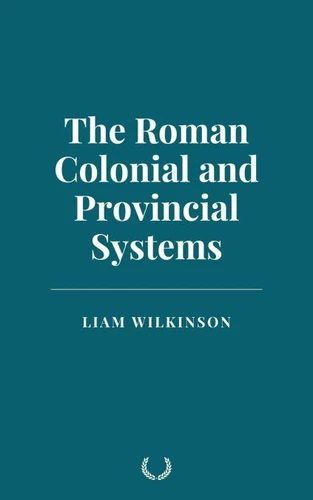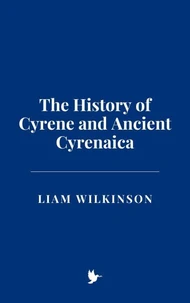The Roman Colonial and Provincial Systems
Par :Formats :
Disponible dans votre compte client Decitre ou Furet du Nord dès validation de votre commande. Le format ePub est :
- Compatible avec une lecture sur My Vivlio (smartphone, tablette, ordinateur)
- Compatible avec une lecture sur liseuses Vivlio
- Pour les liseuses autres que Vivlio, vous devez utiliser le logiciel Adobe Digital Edition. Non compatible avec la lecture sur les liseuses Kindle, Remarkable et Sony
 , qui est-ce ?
, qui est-ce ?Notre partenaire de plateforme de lecture numérique où vous retrouverez l'ensemble de vos ebooks gratuitement
Pour en savoir plus sur nos ebooks, consultez notre aide en ligne ici
- FormatePub
- ISBN8227634870
- EAN9798227634870
- Date de parution23/10/2024
- Protection num.pas de protection
- Infos supplémentairesepub
- ÉditeurBig Dog Books, LLC
Résumé
This book explores the Roman colonial and provincial systems, examining how the Roman Empire governed its vast and diverse territories. From the early Republic to the fall of the empire, Roman provinces played a critical role in maintaining the stability, economic prosperity, and cultural integration of the empire. The book delves into the administrative structures established by emperors such as Augustus, Diocletian, and Constantine, focusing on the evolution of provincial governance, taxation, military organization, and the role of local elites.
Key themes include the division of provinces into senatorial and imperial territories, the reliance on local elites to administer regions, the Roman legal system, and the cultural process of Romanization. The book also explores the impact of reforms, such as Diocletian's subdivision of provinces and Constantine's establishment of Constantinople, on provincial life and governance. The Roman provincial system left an enduring legacy on Western civilization, influencing modern legal and political systems, urban planning, and governance.
Roman law, urban infrastructure, and the concept of citizenship shaped the development of Europe and other regions long after the fall of the empire. The integration of diverse cultures and peoples under a common legal and administrative system offers valuable insights into the empire's ability to sustain a cohesive political structure across vast distances and cultural differences. In addition, the book addresses the economic and social impact of Roman reforms on provincial populations, exploring how changes in taxation, military recruitment, and local governance affected the daily lives of inhabitants.
The legacy of the Roman provincial system continues to resonate in modern governance, law, and urbanization, highlighting its profound influence on world history.
Key themes include the division of provinces into senatorial and imperial territories, the reliance on local elites to administer regions, the Roman legal system, and the cultural process of Romanization. The book also explores the impact of reforms, such as Diocletian's subdivision of provinces and Constantine's establishment of Constantinople, on provincial life and governance. The Roman provincial system left an enduring legacy on Western civilization, influencing modern legal and political systems, urban planning, and governance.
Roman law, urban infrastructure, and the concept of citizenship shaped the development of Europe and other regions long after the fall of the empire. The integration of diverse cultures and peoples under a common legal and administrative system offers valuable insights into the empire's ability to sustain a cohesive political structure across vast distances and cultural differences. In addition, the book addresses the economic and social impact of Roman reforms on provincial populations, exploring how changes in taxation, military recruitment, and local governance affected the daily lives of inhabitants.
The legacy of the Roman provincial system continues to resonate in modern governance, law, and urbanization, highlighting its profound influence on world history.
This book explores the Roman colonial and provincial systems, examining how the Roman Empire governed its vast and diverse territories. From the early Republic to the fall of the empire, Roman provinces played a critical role in maintaining the stability, economic prosperity, and cultural integration of the empire. The book delves into the administrative structures established by emperors such as Augustus, Diocletian, and Constantine, focusing on the evolution of provincial governance, taxation, military organization, and the role of local elites.
Key themes include the division of provinces into senatorial and imperial territories, the reliance on local elites to administer regions, the Roman legal system, and the cultural process of Romanization. The book also explores the impact of reforms, such as Diocletian's subdivision of provinces and Constantine's establishment of Constantinople, on provincial life and governance. The Roman provincial system left an enduring legacy on Western civilization, influencing modern legal and political systems, urban planning, and governance.
Roman law, urban infrastructure, and the concept of citizenship shaped the development of Europe and other regions long after the fall of the empire. The integration of diverse cultures and peoples under a common legal and administrative system offers valuable insights into the empire's ability to sustain a cohesive political structure across vast distances and cultural differences. In addition, the book addresses the economic and social impact of Roman reforms on provincial populations, exploring how changes in taxation, military recruitment, and local governance affected the daily lives of inhabitants.
The legacy of the Roman provincial system continues to resonate in modern governance, law, and urbanization, highlighting its profound influence on world history.
Key themes include the division of provinces into senatorial and imperial territories, the reliance on local elites to administer regions, the Roman legal system, and the cultural process of Romanization. The book also explores the impact of reforms, such as Diocletian's subdivision of provinces and Constantine's establishment of Constantinople, on provincial life and governance. The Roman provincial system left an enduring legacy on Western civilization, influencing modern legal and political systems, urban planning, and governance.
Roman law, urban infrastructure, and the concept of citizenship shaped the development of Europe and other regions long after the fall of the empire. The integration of diverse cultures and peoples under a common legal and administrative system offers valuable insights into the empire's ability to sustain a cohesive political structure across vast distances and cultural differences. In addition, the book addresses the economic and social impact of Roman reforms on provincial populations, exploring how changes in taxation, military recruitment, and local governance affected the daily lives of inhabitants.
The legacy of the Roman provincial system continues to resonate in modern governance, law, and urbanization, highlighting its profound influence on world history.























